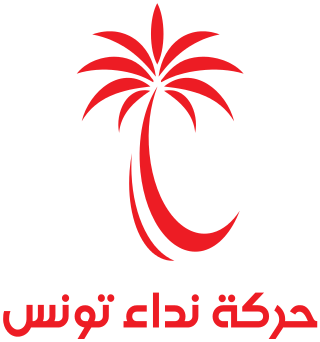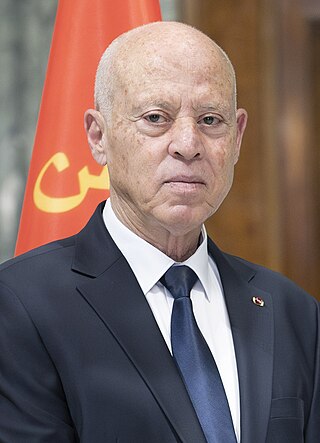Related Research Articles

Tunisia, officially the Republic of Tunisia, is the northernmost country in Africa. It is a part of the Maghreb region of North Africa, bordered by Algeria to the west and southwest, Libya to the southeast, and the Mediterranean Sea to the north and east. Tunisia also shares maritime borders with Italy through the islands of Sicily and Sardinia to the north and Malta to the east. It features the archaeological sites of Carthage dating back to the 9th century BC, as well as the Great Mosque of Kairouan. Known for its ancient architecture, souks, and blue coasts, it covers 163,610 km2 (63,170 sq mi), and has a population of 12.1 million. It contains the eastern end of the Atlas Mountains and the northern reaches of the Sahara desert; much of its remaining territory is arable land. Its 1,300 km (810 mi) of coastline includes the African conjunction of the western and eastern parts of the Mediterranean Basin. Tunisia is home to Africa's northernmost point, Cape Angela. Located on the northeastern coast, Tunis is the capital and largest city of the country, which is itself named after Tunis. The official language of Tunisia is Modern Standard Arabic. The vast majority of Tunisia's population is Arab and Muslim. Vernacular Tunisian Arabic is the most spoken, and French also serves as an administrative and educational language in some contexts, but it has no official status.

Zine El Abidine Ben Ali, commonly known as Ben Ali or Ezzine, was a Tunisian politician who served as the second president of Tunisia from 1987 to 2011. In that year, during the Tunisian revolution, he was overthrown and fled to Saudi Arabia.

The Tunisian Football Federation is the governing body of football in Tunisia. It established on 29 March 1957. It became a member in the FIFA in 1960, and in the same year it also became a member of CAF association. The federation also joined the UAFA in 1976 and the UNAF in 2005.
The Constitution of Tunisia is the supreme law of the Tunisian Republic. The constitution is the framework for the organization of the Tunisian government and for the relationship of the federal government with the governorates, citizens, and all people within Tunisia. Tunisia's first modern constitution was the Fundamental Pact of 1857. This was followed by the Constitution of 1861, which was not replaced until after the departure of French administrators in 1956, by the constitution of 1959. It was adopted on 1 June 1959 and amended in 1999 and 2002, after the Tunisian constitutional referendum of 2002.

The Tunisian revolution, also called the Jasmine Revolution and Tunisian Revolution of Dignity, was an intensive 28-day campaign of civil resistance. It included a series of street demonstrations which took place in Tunisia, and led to the ousting of longtime dictator Zine El Abidine Ben Ali in January 2011. It eventually led to a thorough democratization of the country and to free and democratic elections, which had led to people believing it was the only successful movement in the Arab Spring.

Mohamed Moncef Marzouki is a Tunisian politician who served as the fifth president of Tunisia from 2011 to 2014. Through his career he has been a human rights activist, physician and politician. On 12 December 2011, he was elected President of Tunisia by the Constituent Assembly.

Beji Caid Essebsi served as the fifth president of Tunisia from 31 December 2014 until his death on 25 July 2019. Previously, he served as minister of foreign affairs from 1981 to 1986 and prime minister from February to December 2011.
Abdallah Kallel(عبد الله القلال) is a Tunisian politician. He was the President of the Chamber of Advisors from 16 August 2005 until 25 January 2011.

Noureddine Bhiri is a Tunisian politician. He served as the Minister of Justice under Prime Minister Hamadi Jebali.

Nidaa Tounes is a big tent secularist political party in Tunisia. After being founded in 2012, the party won a plurality of seats in the October 2014 parliamentary election. The party's founding leader Beji Caid Essebsi was elected President of Tunisia in the 2014 presidential election.

Selma Elloumi Rekik is originally from Tunis. She is a businesswoman, Tunisian politician and was a member of Nidaa Tounes, though she currently is part of Al Amal.
The 1987 Tunisian coup d'état involved the bloodless ousting of the aging President of Tunisia Habib Bourguiba on 7 November 1987, and his replacement as President by his recently appointed Prime Minister, Zine El Abidine Ben Ali. The action was justified by reference to Bourguiba's failing health and Article 57 of the country's constitution. Reports later surfaced to indicate that the Italian intelligence services had been involved in planning it.

Kais Saied is a Tunisian politician, jurist and retired assistant professor of law currently serving as the seventh president of Tunisia since October 2019. He was president of the Tunisian Association of Constitutional Law from 1995 to 2019.

Nabil Karoui is a Tunisian politician and businessman. One of the key figures in the Tunisian media landscape, Karoui is CEO of Karoui & Karoui World and owner of the Tunisian television station Nessma. Karoui ran as a candidate in the 2019 Tunisian presidential election, finishing in second place.
Events in the year 2020 in Tunisia.
Events in the year 2021 in Tunisia.

Chedly Ayari was a Tunisian politician, economist, and diplomat. He served in several ministerial positions under the government of Habib Bourguiba and was President of the Central Bank of Tunisia from 24 July 2012 to 16 February 2018.

Ghazi Jeribi is a Tunisian politician. He served as Minister of Defence in the cabinet of Prime Minister Mehdi Jomaa. He also served as Minister of Justice in the cabinet of Prime Minister Youssef Chahed.

A constitutional referendum was held in Tunisia on 25 July 2022 by the Independent High Authority for Elections. The referendum was supported by the Tunisian president, Kais Saied, one year into a political crisis that began on 25 July 2021. The referendum was preceded by an electronic consultation regarding the nature of the political system and the method of voting in legislative elections. It was boycotted by many of Tunisia's largest political parties.
References
- ↑ "Biographie de Hafedh Ben Salah, ministre de la Justice". Business News (in French). 28 January 2014. Retrieved 14 February 2021.
- ↑ "Tunisia parliament approves new cabinet line-up". The Manila Times. 29 January 2014. Retrieved 14 February 2021.
- ↑ "Tunisie: le nouveau gouvernement obtient la confiance du Parlement". Le Point (in French). 29 January 2014. Retrieved 14 February 2021.